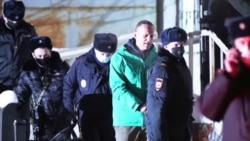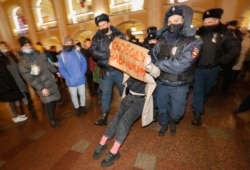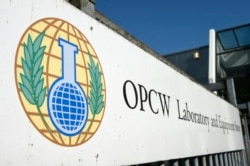On January 17, Russian opposition leader Alexei Navalny returned to Russia nearly five months after being poisoned with the military-grade nerve agent Novichok in the Russian city of Tomsk.
Navalny’s flight from Berlin to Moscow’s Vnukovo Airport, where a large crowd of supporters and journalists had gathered, was diverted to the Russian capital's Sheremetyevo Airport for what the airline called “technical reasons.”
Navalny was subsequently detained at passport control over alleged parole violations related to a 2014 fraud conviction he has called “politically motivated.”
The European Court of Human Rights (ECHR) ruled the conviction in the so-called Yves Rocher case “arbitrary and manifestly unreasonable.”
The ECHR further demanded Navalny and his business partners be compensated, as Russia denied their right to a fair trial.
However, Russia’s Federal Penitentiary Service (FSIN) said the fact that Navalny was “undergoing rehabilitation procedures” after being airlifted to Germany for treatment was no justification for missing a parole hearing.
On January 18, a makeshift court in the Moscow suburb of Khimki ruled that Navalny must remain in custody until February 15. Another court will then determine whether Navalny will be forced to serve a suspended, 3 1/2-year sentence in the fraud case.
Navalny called the proceedings a mockery of justice, and told Russian citizens to take to the streets, not for him, but for “themselves and their future.”
Amnesty International labeled Navalny a “prisoner of conscience.”
Following criticism from American and European politicians, Russian Foreign Minister Sergey Lavrov accused the West of using the Navalny case “to distract public attention from the existential crisis they live in.”
"The Navalny case acquired a foreign policy tone artificially, I would say, and completely unlawfully,” Lavrov said.
That is false.
A state-sanctioned assassination attempt using a military-grade chemical weapon would constitute a serious breach of international law. The European Union and UK have already sanctioned six individuals, including Alexander Bortnikov, who heads Russia’s Federal Security Service (FSB), the successor to the KGB, and Sergei Kiriyenko, Russian President Vladimir Putin’s deputy chief of staff.
Russia has steadfastly denied any involvement in the poisoning, which was confirmed by lab tests conducted under the Organization for the Prohibition of Chemical Weapons (OPCW) and others. The move to arrest Navalny, and not those responsible for his poisoning, prompted calls for additional sanctions.
Lavrov claimed Moscow had not been shown proof of Navalny’s poisoning.
“[Navalny says] ‘I was poisoned by the Russian state and personally by Vladimir Putin,’ and this is unquestionably taken in by the West, and the West only presents us with facts that Navalny himself spells out in debriefings with German law enforcement agencies,” Lavrov said.
On October 6, 2020, the OPCW confirmed the poison used was from the Novichok group, which the Soviet Union developed. German, French and Swiss labs reached the same conclusion. Lavrov has tried to cast doubt on that evidence by accusing the OPCW of being “privatized” by the West.
Russia has long demanded that Germany hand over biomaterials, examination results and test samples from the Navalny poisoning case. Russia maintains that without those materials, there is no basis to open a criminal investigation into Navalny’s poisoning. Germany’s Defense Ministry refused to share this information directly, arguing it is unnecessary since Russia belongs to the OPCW.
German Chancellor Angela Merkel’s spokesman Steffen Seibert said the OPCW was best positioned the deal with the case, as the issue was “not a bilateral German-Russian problem,” the Associated Press reported.
“This is about a crime that took place in Russia with a chemical nerve agent that is internationally prohibited — the OPCW is the logical point of contact,” Seibert said.
Germany recently gave Navalny’s interrogation protocols to the Russian government, after which a German justice ministry spokesman said Moscow had all of the necessary information to carry out a criminal investigation into the poisoning, including blood, clothing and tissue samples, Deutsche Welle reported.
Meanwhile, media reports suggest Russian authorities directed the attempted assassination.
First, an investigation jointly conducted by UK-based investigative website Bellingcat and Russia’s investigative website The Insider, in cooperation with Germany’s Der Spiegel and CNN, revealed links to Russia’s security services.
That investigation uncovered telephone metadata and call records linking would-be FSB assassins to employees of Russian institutes involved in Soviet-era nerve-agent programs.
Information gleaned from passenger manifests helped Bellingcat determine that FSB operatives from a clandestine unit specializing in work with poisonous substances traveled alongside Navalny to Tomsk, where the opposition leader was exposed to Novichok on August 19. Mobile phone data bots placed the mobile device of one FSB operative within the range of a tower not far from the hotel where Navalny was staying on the day he was poisoned.
The investigative team determined that members of that same FSB unit had traveled alongside Navalny on more than 30 overlapping flights since 2017.
On December 21, Bellingcat released a video recording of a phone call in which Navalny posed as “Maxim Ustinov,” a fictional aide to Russian Security Council Secretary Nikolai Patrushev. Navalny called to a mobile phone listed as belonging to FSB operative Konstantin Kudryavtsev. Bellingcat’s investigation named Kudryavtsev as a member of the FSB squad tasked with poisoning Navalny and cleaning up the evidence.
Kudryavtsev answered Navalny’s questions, demonstrating what appeared to be inside knowledge of the poisoning operation. Apart from confirming key details of Bellingcat’s investigation, Kudryavtsev said that the chemical agent Novichok used in the operation had been applied to a pair of Navalny's underwear. Kudryavtsev said that his task was to clean traces of the substance from Navalny’s belongings.
Meanwhile, Lavrov compared the Navalny case to the poisonings of Alexander Litvinenko, and of Sergei Skripal and his daughter Yulia, likewise alleging “zero facts” had been provided to Russia.
Litvinenko a former KGB and FSB officer, died of radiation poisoning in Britain in 2006. A British public inquiry found that his murder was an FSB operation “probably” approved by Russian President Vladimir Putin.
The Skirpals were hospitalized in critical condition after being exposed to a Novichok variant. In the Skripal case, two British citizens unconnected to the Skripals were also poisoned. One of them, Dawn Sturgess, died as a result.
British and independent investigations identified three likely suspects, all Russian nationals believed to be military intelligence officers. As with Navalny’s case, Russia officially denied any involvement and spun out multiple other explanations.








